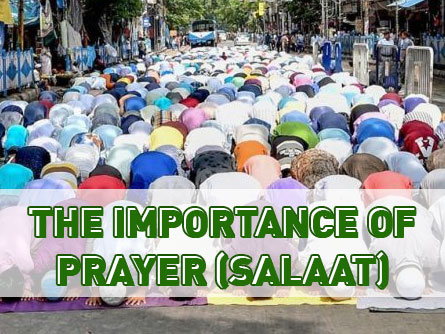Struggling in Life? Discover How Salah Can Change Everything!
The Holy Quran states:
"Recite what has been revealed to you of the Book, and establish prayer. Indeed, prayer prevents immorality and wrongdoing."
In this verse, it is clearly mentioned that prayer has the unique ability to prevent a person from wrongdoing and helps in their moral reform. Many hadiths explain that those who establish prayer properly gradually abandon sins and bad habits over time.
The True Meaning of Establishing Salah (Iqamat-e-Salat)
The term “Iqamat-e-Salat” does not simply mean performing Salah as a routine task, but rather, offering it with complete devotion and adherence to its outward and inward etiquettes, as demonstrated by the Prophet Muhammad (peace be upon him).
For example:
- Understanding and Observing Its Conditions, Sunnahs, and Etiquettes – One must acquire the correct knowledge of Salah and follow its conditions, Sunnah practices, and etiquettes as accurately as possible.
- Attaining Humility and Sincerity in Salah – One should perform Salah with deep humility and presence of mind, as if they are standing before Allah and conversing with Him.
When a person establishes Salah in this manner, they are naturally granted the ability by Allah to perform righteous deeds and develop a strong inclination to stay away from evil. However, if someone performs Salah regularly yet continues to engage in immoral behavior or wrongdoing, they should realize that there is a deficiency in their prayer.
To truly establish Salah, consider the following:
Learn the Conditions and Sunnahs – Understanding the correct method of Salah ensures that all essential aspects are fulfilled.
Cultivate Humility and Sincerity – Imagine standing before Allah and conversing with Him; this mindset fosters devotion.
Focus on the Meaning – Understanding the supplications and verses recited in Salah enhances engagement and reflection.
The Prophet Muhammad (peace be upon him) said:
"If a person's Salah does not prevent them from immorality and wrongdoing, then their Salah is meaningless."
Thus, it is essential that Salah is not seen as a mere burden to be fulfilled but rather as a means of true spiritual connection with Allah.
How Salah Influences Personal Development
Many Muslims perform Salah daily, but not all may experience its full spiritual and moral impact. The key lies in understanding and performing Salah correctly with sincerity and devotion. Here’s how it aids in self-improvement:
Strengthens the Connection with Allah – When performed with complete devotion, Salah becomes a means of direct communication with Allah, bringing inner peace and spiritual strength.
Encourages Self-Discipline – Praying five times a day instills discipline and structure, helping individuals lead an organized life.
Purifies the Heart and Soul – Regular prayer cleanses the heart from negative thoughts, arrogance, and malice, making a person more compassionate and kind.
Develops a Sense of Accountability – Knowing that one has to stand before Allah regularly encourages ethical behavior and mindfulness in daily actions.
Provides Emotional and Mental Stability – Engaging in prayer helps reduce stress, anxiety, and depression by fostering mindfulness and reliance on Allah’s mercy.
Can Salah Help Overcome Bad Habits and Sins?
There was a man who used to perform Tahajjud (late-night prayer) but would steal during the day. When the Prophet Muhammad (peace be upon him) was informed about him, he said:
"Very soon, his Salah will stop him from stealing."
(Reference: Tafsir Ibn Kathir)
After some time, the man repented and completely abandoned theft. This hadith shows how prayer gradually helps a person leave sins and bad habits behind.
Self-Reflection on Our Prayers
Nowadays, many people perform Salah regularly but still engage in various sins or immoral actions. According to the hadith, this means that there is some deficiency in their prayer. If they correct this deficiency and perform Salah with sincerity and proper etiquettes, then, as per Allah’s promise, Salah will certainly prevent them from evil deeds.
Thus, Salah is the best means for self-reform and moral development.
Making Salah a Transformative Experience
Salah is not just an obligation; it is a divine tool for self-improvement and spiritual elevation. By committing to sincere and mindful prayer, believers can experience profound personal growth, moral discipline, and a deeper connection with Allah.
Let us strive to perfect our Salah and experience its true impact in our lives. May Allah guide us in establishing our prayers with sincerity and devotion. Ameen.
A Prayer for Guidance
"O Allah, grant us the ability to perform Salah with all its outward and inward etiquettes so that we may benefit from its blessings in this world and the Hereafter. Ameen."







































